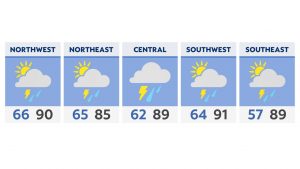CLEVELAND — For many people in the nursing profession, it’s more than a career, it’s a calling. Now, more nurses are needed to answer that call.
“During the pandemic, you had people leaving positions and now you have to fill those positions again,” said Hospice of the Western Reserve Pediatric Team Leader Jennifer Palmer. “And it’s really important, especially in an area like hospice where it’s specialized, that you get people that are willing to do hospice services.”
Right now, Palmer said the pediatric unit is at about half the staff they need to comfortably serve patients across all of northern Ohio.
Krista Jackson, a licensed practical nurse with Hospice of the Western Reserve, visits patients like Major Remington Hunter at their homes. She said she does an in-person assessment of him every week.
“Listening to his belly to make sure everything’s moving in there and just kind of looking him over to make sure he’s okay,” she said. “And he looks great this week.”
Jackson helps Major’s parents, Charles and Patricia Hunter, with his care.
“The doctor said that everything that could go wrong with his birth went wrong,” said Charles Hunter. “He had a total system failure. Lost his oxygen, lost his blood supply.”
Charles and his wife Patricia first brought Major into their home as a foster child. They officially adopted him last fall.
“Almost everything has been resolved, except for the severe brain injury,” Charles said. “He now has spastic cerebral palsy. He also has epilepsy, and he has about four different types of seizures.”
Because of his condition, Major’s parents said he is not expected to live a long life.
“His prognosis, of course, is basically terminal,” Charles Hunter said. “It’s just a question of when.”
Now at age 2, Major’s family said they are treating each day as a gift.
“They need a mommy and daddy that will love them, rock them and take care of them to their very best until God calls them home,” Patricia Hunter said.
Jackson helps coordinate Major’s care with Akron Children’s Hospital’s palliative care unit.
“It has to be in your heart that this is where you’re supposed to be,” she said.




